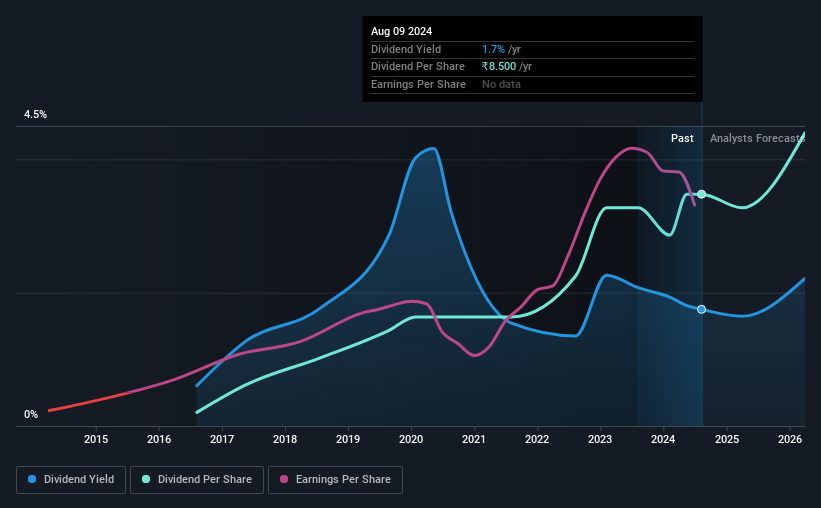- India
- /
- Paper and Forestry Products
- /
- NSEI:JKPAPER
JK Paper (NSE:JKPAPER) Is Increasing Its Dividend To ₹5.00
JK Paper Limited (NSE:JKPAPER) has announced that it will be increasing its dividend from last year's comparable payment on the 3rd of October to ₹5.00. This makes the dividend yield 1.7%, which is above the industry average.
While the dividend yield is important for income investors, it is also important to consider any large share price moves, as this will generally outweigh any gains from distributions. Investors will be pleased to see that JK Paper's stock price has increased by 37% in the last 3 months, which is good for shareholders and can also explain a decrease in the dividend yield.
See our latest analysis for JK Paper
JK Paper's Dividend Is Well Covered By Earnings
While it is great to have a strong dividend yield, we should also consider whether the payment is sustainable. Before making this announcement, JK Paper was easily earning enough to cover the dividend. This means that most of its earnings are being retained to grow the business.
Over the next year, EPS is forecast to expand by 17.3%. If the dividend continues along recent trends, we estimate the payout ratio will be 16%, which is in the range that makes us comfortable with the sustainability of the dividend.

JK Paper's Dividend Has Lacked Consistency
JK Paper has been paying dividends for a while, but the track record isn't stellar. This makes us cautious about the consistency of the dividend over a full economic cycle. The annual payment during the last 8 years was ₹0.50 in 2016, and the most recent fiscal year payment was ₹8.50. This implies that the company grew its distributions at a yearly rate of about 42% over that duration. Dividends have grown rapidly over this time, but with cuts in the past we are not certain that this stock will be a reliable source of income in the future.
The Dividend Looks Likely To Grow
With a relatively unstable dividend, it's even more important to see if earnings per share is growing. We are encouraged to see that JK Paper has grown earnings per share at 18% per year over the past five years. A low payout ratio and decent growth suggests that the company is reinvesting well, and it also has plenty of room to increase the dividend over time.
We Really Like JK Paper's Dividend
Overall, a dividend increase is always good, and we think that JK Paper is a strong income stock thanks to its track record and growing earnings. Distributions are quite easily covered by earnings, which are also being converted to cash flows. Taking this all into consideration, this looks like it could be a good dividend opportunity.
Market movements attest to how highly valued a consistent dividend policy is compared to one which is more unpredictable. At the same time, there are other factors our readers should be conscious of before pouring capital into a stock. For instance, we've picked out 2 warning signs for JK Paper that investors should take into consideration. Looking for more high-yielding dividend ideas? Try our collection of strong dividend payers.
New: Manage All Your Stock Portfolios in One Place
We've created the ultimate portfolio companion for stock investors, and it's free.
• Connect an unlimited number of Portfolios and see your total in one currency
• Be alerted to new Warning Signs or Risks via email or mobile
• Track the Fair Value of your stocks
Have feedback on this article? Concerned about the content? Get in touch with us directly. Alternatively, email editorial-team (at) simplywallst.com.
This article by Simply Wall St is general in nature. We provide commentary based on historical data and analyst forecasts only using an unbiased methodology and our articles are not intended to be financial advice. It does not constitute a recommendation to buy or sell any stock, and does not take account of your objectives, or your financial situation. We aim to bring you long-term focused analysis driven by fundamental data. Note that our analysis may not factor in the latest price-sensitive company announcements or qualitative material. Simply Wall St has no position in any stocks mentioned.
About NSEI:JKPAPER
Flawless balance sheet and undervalued.
Market Insights
Weekly Picks


Crazy Undervalued 42 Baggers Silver Play (Active & Running Mine)


Fiducian: Compliance Clouds or Value Opportunity?

Willamette Valley Vineyards (WVVI): Not-So-Great Value
Recently Updated Narratives

Watch Pulse Seismic Outperform with 13.6% Revenue Growth in the Coming Years

Significantly undervalued gold explorer in Timmins, finally getting traction

Moderation and Stabilisation: HOLD: Fair Price based on a 4-year Cycle is $12.08
Popular Narratives


MicroVision will explode future revenue by 380.37% with a vision towards success


NVDA: Expanding AI Demand Will Drive Major Data Center Investments Through 2026





